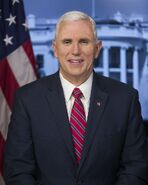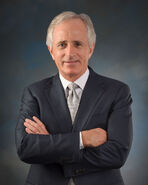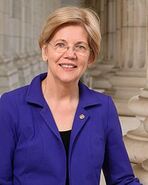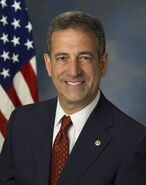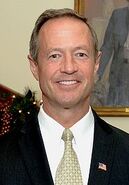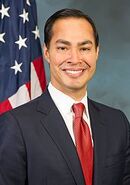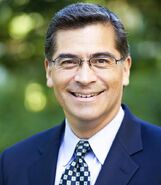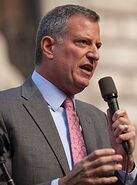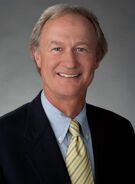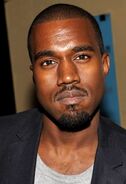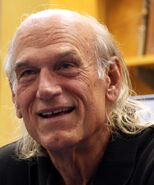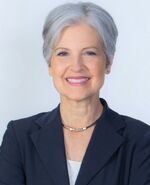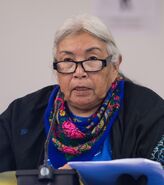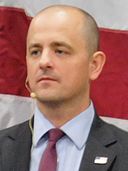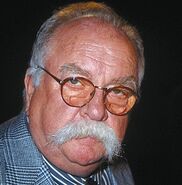The United States presidential election of 2020, took place on November 3, 2020 and was the 59th quadrennial U.S. presidential election. Voters selected presidential electors who in turn elected a new president and vice president through the electoral college. The series of presidential primary elections and caucuses were held during the first six months of 2020. This nominating process is also an indirect election, where voters cast ballots selecting a slate of delegates to a political party's nominating convention, who then in turn elect their party's presidential nominee.
Previous winner, Republican Donald Trump, who was elected in 2016, became impeached in early 2018, for conflict of interest with Russia, and will not be able to seek re-election. His successor, Mike Pence confirmed he would seek for a second term in 2020, while trying to continue making the United States a Christian Theocracy.
The winner of the 2020 presidential election was scheduled to be inaugurated on January 20, 2021.
Republican Party[]
Further reading: Mike Pence presidential campaign, 2020
Mike Pence was eligible to run for re-election and implied on numerous cases that he intended to do so. He was unopposed throughout the Republican primary and was quickly announced as the presumptive nominee by the Republican National Committee.
A week before the Republican National Convention took place, Mike Pence announced that US Senator Bob Corker would be his pick for running mate.
At the Republican National Convention, both Mike Pence and Bob Corker were nominated by acclimation, after facing no contention.
Mike Pence's presidential campaign was described by political experts as being a mix of conservatism and christian democracy. The major demographics that stood in support to his campaign were Republican voters, Christian Fundamentalists and right-wing activists. However, he was heavily criticised by the likes of InfoWars-founder Alex Jones, Ann Coulter and the French President Marine Le Pen for "softening" the policies of his predecessor, President Trump.
More info to be added
Nominee[]
- Mike Pence; 46th President of the United States (since 2018)
- Running mate: Bob Corker; US Senator of Tennessee (since 2007)
Democratic Party[]
Further reading:
- Democratic Party presidential primaries, 2020
- Elizabeth Warren presidential campaign, 2020
- Bob Iger presidential campaign, 2020
- Gary Johnson presidential campaign, 2020
A number of twelve candidates announced their intentions to run for the Democratic ticket in 2020. Early polling before the first presidential debate indicated that the primary was going to be a close race between three candidates, Bob Iger, Elizabeth Warren and Gary Johnson. While Bob Iger appealed to more centrist democrats, Elizabeth Warren received major support from more progressive and millennial voters. Gary Johnson, who ran as a Libertarian in the previous two elections, witnessed a major surge in several polls, to the point of being tied with either Iger or Warren. In some polls, Tulsi Gabbard had also gained major support.
After failing to gain momentum in the first Democratic debate, both Governor Lincoln Chafee and Governor John Bel Edwards withdrew their candidacies from the Presidential ticket. Mayor Bill de Blasio withdrew after the second debate, while Xavier Becerra suspended his campaign for the presidency after the third debate.
The primaries began in February 2020 and lasted until June. After failing to receive any delegates after the Iowa caucus, Secretary Julian Castro, Governor Martin O'Malley and Secretary Jason Kander all withdrew their bids for the presidency. Lawrence Lessig suspended his campaign after the primary in New Hampshire. He received a total of 3 delegates. After the South Carolina primary, Tulsi Gabbard withdrew after receiving only 13 delegates at total.
The Super Tuesday primaries saw a major upset in Texas, when Elizabeth Warren won the state with a margin of only 0,2%. Bob Iger was predicted to win the state with about 7%. Meanwhile, Gary Johnson decided to withdraw from the Democratic primary after a "poor performance", but expressed his gratitude for all the support he had gained and pledged his support for whoever would end up being the Democratic nominee. He had won a total of 144 delegates.
One of the most well known events that occurred in this primary was during the debate in Michigan, where Elizabeth Warren unexpectedly called out the Democratic National Committee for "trying to rig the system" and that Bob Iger "wouldn't do anything to change that if elected". These comments were heavily criticized by several insiders within the Democratic Party. Journalist and former advisor of Hillary Clinton, Peter Daou, an early supporter of Iger, demanded that "Senator Warren apologizes at once for her remarks". However, she received massive praise from the likes of Senator Bernie Sanders, Deputy Chair Keith Ellison and Green Party-candidate Jill Stein, with Sanders stating that "Warren brings a very important discussion into the political process, that really needs to be addressed". DNC-Chairman Tom Perez refused to give any comments on Warren's statements. In retrospect, political experts have cited this event as "possibly the major reason" why Iger lost the primary in Michigan.
Yet another upset occurred in the New York primary when Warren won with over 55%, despite polls indicating Iger would win easily.
After the primaries in California, Montana, New Jersey, New Mexico, North Dakota and South Dakota, Elizabeth Warren was proclaimed the presumptive nominee, after reaching the threshold in pledged delegates. However, when counting super delegates, both Warren and Iger had reached over 2 146 delegates. Despite his defeat, Bob Iger pledged to stay in the race until the Democratic National Convention.
Just a few days before the Democratic National Convention, Elizabeth Warren announced that she had picked former Senator Russ Feingold as her running mate.
After an arguably competitive roll call vote between her and Bob Iger, Elizabeth Warren was eventually oficially nominated as the Democratic candidate, forcing Iger to finally concede.
Nominee[]
- Elizabeth Warren presidential campaign, 2020
More info to be added
- Elizabeth Warren; US Senator from Massachussetts (since 2013)
- Running mate: Russ Feingold; US Senator from Wisconsin (1993-2011)
Other candidates[]
- Bob Iger; businessman from California [lost nomination after the Democratic National Convention]
- Gary Johnson; Governor from New Mexico (1995-2003) [withdrew after the Super Tuesday primaries and caucuses]
- Tulsi Gabbard; US Representative from Hawaii (since 2013) [withdrew after the South Carolina primary]
- Lawrence Lessig; academic, attorney, and political activist from Massachussetts [withdrew after the New Hampshire primary]
- Martin O'Malley; Governor from Maryland (2007–2015) [withdrew after the Iowa caucus]
- Julian Castro; US Secretary of Housing and Urban Development from Texas (2014–2017) [withdrew after the Iowa caucus]
- Jason Kander; Secretary of State from Missouri (2013–2017) [withdrew after the Iowa caucus]
- Xavier Becerra; Attorney General from California (since 2017) [withdrew after the 3rd debate]
- Bill de Blasio; Mayor from New York (since 2014) [withdrew after the 2nd debate]
- John Bel Edwards; Governor from Louisiana (since 2016) [withdrew after the 1st debate]
- Lincoln Chafee; Governor from Rhode Island (2011–2015) [withdrew after the 1st debate]
Kanye West's candidacy[]
Further reading: Kanye West presidential campaign, 2020
In the spring of 2019, Kanye West launched his presidential campaign as an independent. Political experts described his platform as left-wing populist and black nationalist. He gained strong support from african-american voters from the south and received endorsements from numerous left-wing foreign leaders.
His campaign was highly controversial and received strong criticism from both Democratic and Republican insiders, many of which claimed he was "mentally unfit" for the presidency. Amongst more conservative media outlets, many accused his campaign of being socialist, communist or anarchist, claims of which Kanye himself have denied numerous times.
In early February 2020, Kanye West announced Black Lives Matter-founder and activist Alicia Garza as his running mate.
His campaign was caught under fire, when it had been discovered during the Democratic primary in Maryland, that a group of West-supporters had entered voting stations across the state and voted with blank paper-ballots, in an attempt to disrupt the primary. Kanye West himself did not make any comments on these actions.
More info to be added
- Kanye West; rapper, fashion designer, and entrepreneur from California
- Running mate: Alicia Garza; activist and editorial writer from California
Other Third Party Candidates[]
Two more third party candidates managed to receive ballot access to all 538 electoral votes. Those two candidates were Jesse Ventura for the Libertarian Party and Jill Stein for the Green Party. Evan McMullin for the Constitution Party received ballot access to 483 electoral votes, with no ballot access in Georgia, Indiana, Nevada, North Carolina and Oklahoma. Arlin Horton for the Christian Totalitarian Party received ballot access to 447 electoral votes, with no ballot access in California, District of Columbia, Massachusetts, Oregon, Vermont and Washington State.
Libertarian Party[]
Further reading: Jesse Ventura presidential campaign, 2020
- Jesse Ventura; Governor of Minnesota (1999-2003)
- Running mate: Austin Petersen; activist and commentator from Missouri
Green Party[]
Further reading: Jill Stein presidential campaign, 2020
- Jill Stein; physician and activist from Massachussetts
- Running mate: Faith Spotted Eagle; activist from South Dakota
Constitution Party[]
Further reading: Evan McMullin presidential campaign, 2020
- Evan McMullin; former CIA operations officer from Utah
- Running mate: Wilford Brimley; Actor and spokesperson for Liberty Medical
New IFB Party (Independent Fundamental Baptist)[]
Further Reading: Steven Anderson presidential campaign, 2020
Further Reading: Scenario: Christian States of America
- Steven Anderson; Founder/Pastor of Faithful Word Baptist Church
- Running mate: Roger Jimenez; Anti-Gay activist, pastor of Verity Baptist Church in California.
Presidential debates[]
More info to be added
Democratic primary debates[]
To be added
General election debates[]
To be added
Results[]
Turnout; 39 542 244
- (D); Elizabeth Warren / Russ Feingold (47,3%)
- (R); Mike Pence / Bob Corker (39,0%)
- (I); Kanye West / Alicia Garza (10,0%)
- (L); Jesse Ventura / Austin Petersen (1,7%)
- (G); Jill Stein / Faith Spotted Eagle (0,8%)
- (C); Evan McMullin / Wilford Brimley (0,4%)
- (CT); Steven Anderson / Roger Jimenez (TBA)
Statewide[]
Connecticut[]
Turnout; 1 867 261
- Elizabeth Warren/Russ Feingold (46,2%) [862 675]
- Mike Pence/Bob Corker (38,1%) [711 426]
- Kanye West/Alicia Garza (12,8%) [239 009]
- Jesse Ventura/Austin Petersen (1,1%) [20 540]
- Jill Stein/Faith Spotted Eagle (0,9%) [16 805]
- Evan McMullin/Wilford Brimley (0,3%) [5 602]
- [other candidates] (0,6%) [11 204]
Delaware[]
Turnout; 482 425
- Mike Pence/Bob Corker (41,6%) [200 689]
- Elizabeth Warren/Russ Feingold (39,3%) [189 593]
- Kanye West/Alicia Garza (16,2%) [78 153]
- Jesse Ventura/Austin Petersen (1,4%) [6 754]
- Jill Stein/Faith Spotted Eagle (0,8%) [3 859]
- Evan McMullin/Wilford Brimley (0,3%) [1 447]
- [other candidates] (0,4%) [1 930]
District of Columbia[]
Turnout; 347 396
- Elizabeth Warren/Russ Feingold (71,8%) [249 431]
- Kanye West/Alicia Garza (18,5%) [64 268]
- Mike Pence/Bob Corker (4,1%) [14 243]
- Jesse Ventura/Austin Petersen (2,6%) [9 032]
- Jill Stein/Faith Spotted Eagle (1,4%) [4 864]
- Evan McMullin/Wilford Brimley (1,1%) [3 821]
- [other candidates] (0,5%) [1 737]
Indiana[]
Kentucky[]
Maine[]
Turnout; 677 958
- Elizabeth Warren/Russ Feingold (44,6%) [302 369]
- Mike Pence/Bob Corker (41,5%) [281 352]
- Kanye West/Alicia Garza (9,9%) [67 118]
- Jesse Ventura/Austin Petersen (1,7%) [11 525]
- Jill Stein/Faith Spotted Eagle (0,8%) [5 424]
- Evan McMullin/Wilford Brimley (0,4%) [2 712]
- [other candidates] (1,1%) [7 458]
Maryland[]
Turnout; 3 008 223
- Elizabeth Warren/Russ Feingold (40,4%) [1 215 322]
- Mike Pence/Bob Corker (40,2%) [1 209 306]
- Kanye West/Alicia Garza (16,2%) [487 332]
- Jesse Ventura/Austin Petersen (1,5%) [45 123]
- Jill Stein/Faith Spotted Eagle (0,7%) [21 058]
- Evan McMullin/Wilford Brimley (0,4%) [12 033]
- [other candidates] (0,6%) [18 049]
Massachussetts[]
Turnout; 3 872 821
- Elizabeth Warren/Russ Feingold (61,4%) [2 377 912]
- Mike Pence/Bob Corker (30,2%) [1 169 592]
- Kanye West/Alicia Garza (5,5%) [213 005]
- Jill Stein/Faith Spotted Eagle (1,3%) [50 347]
- Jesse Ventura/Austin Petersen (1,0%) [38 728]
- Evan McMullin/Wilford Brimley (0,4%) [15 491]
- [other candidates] (0,2%) [7 746]
Michigan[]
New Hampshire[]
Turnout; 667 399
- Elizabeth Warren/Russ Feingold (44,1%) [294 323]
- Mike Pence/Bob Corker (42,5%) [283 644]
- Kanye West/Alicia Garza (8,2%) [54 727]
- Jesse Ventura/Austin Petersen (3,7%) [24 694]
- Jill Stein/Faith Spotted Eagle (0,6%) [4 004]
- Evan McMullin/Wilford Brimley (0,2%) [1 335]
- [other candidates] (0,7%) [4 672]
New Jersey[]
Turnout; 4 472 233
- Elizabeth Warren/Russ Feingold (47,3%) [2 115 367]
- Mike Pence/Bob Corker (40,8%) [1 824 671]
- Kanye West/Alicia Garza (8,5%) [380 140]
- Jesse Ventura/Austin Petersen (1,4%) [62 611]
- Jill Stein/Faith Spotted Eagle (0,9%) [40 250]
- Evan McMullin/Wilford Brimley (0,5%) [22 361]
- [other candidates] (0,6%) [26 833]
New York[]
Turnout; 10 095 853
- Elizabeth Warren/Russ Feingold (48,1%) [4 856 105]
- Mike Pence/Bob Corker (38,3%) [3 866 712]
- Kanye West/Alicia Garza (10,2%) [1 029 777]
- Jesse Ventura/Austin Petersen (1,6%) [161 534]
- Jill Stein/Faith Spotted Eagle (0,9%) [90 863]
- Evan McMullin/Wilford Brimley (0,5%) [50 479]
- [other candidates] (0,4%) [40 383]
Pennsylvania[]
Turnout; 6 401 252
- Elizabeth Warren/Russ Feingold (42,8%) [2 739 736]
- Mike Pence/Bob Corker (40,5%) [2 592 507]
- Kanye West/Alicia Garza (13,2%) [844 965]
- Jesse Ventura/Austin Petersen (1,8%) [115 223]
- Jill Stein/Faith Spotted Eagle (1,0%) [64 013]
- Evan McMullin/Wilford Brimley (0,4%) [25 605]
- [other candidates] (0,3%) [19 204]
Ohio[]
Turnout; 5 806 713
- Elizabeth Warren/Russ Feingold (47,7%) [2 769 802]
- Mike Pence/Bob Corker (42,3%) [2 456 239]
- Kanye West/Alicia Garza (6,6%) [383 243]
- Jesse Ventura/Austin Petersen (1,9%) [110 328]
- Jill Stein/Faith Spotted Eagle (0,7%) [40 647]
- Evan McMullin/Wilford Brimley (0,5%) [29 034]
- [other candidates] (0,3%) [17 420]
Rhode Island[]
Turnout; 570 401
- Elizabeth Warren/Russ Feingold (50,6%) [288 623]
- Mike Pence/Bob Corker (38,4%) [219 034]
- Kanye West/Alicia Garza (7,7%) [43 921]
- Jesse Ventura/Austin Petersen (1,7%) [9 697]
- Jill Stein/Faith Spotted Eagle (0,8%) [4 563]
- Evan McMullin/Wilford Brimley (0,3%) [1 711]
- [other candidates] (0,5%) [2 852]
Vermont[]
Turnout; 331 802
- Elizabeth Warren/Russ Feingold (52,4%) [173 864]
- Mike Pence/Bob Corker (32,6%) [108 167]
- Kanye West/Alicia Garza (10,1%) [33 512]
- Jesse Ventura/Austin Petersen (1,4%) [4 645]
- Jill Stein/Faith Spotted Eagle (1,0%) [3 318]
- Evan McMullin/Wilford Brimley (0,3%) [995]
- [other candidates] (2,2%) [7 300]
Virginia[]
West Virginia[]
Turnout; 940 506
- Mike Pence/Bob Corker (54,6%) [513 516]
- Elizabeth Warren/Russ Feingold (32,1%) [301 902]
- Jesse Ventura/Austin Petersen (6,8%) [63 954]
- Kanye West/Alicia Garza (5,1%) [47 966]
- Jill Stein/Faith Spotted Eagle (0,6%) [5 643]
- Evan McMullin/Wilford Brimley (0,5%) [4 703]
- [other candidates] (0,3%) [2 822]
Wyoming[]
To be added








